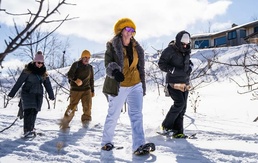Another Round of Fracking in Northern Michigan
Nov. 13, 2011

Two natural gas drilling operations underway in Kalkaska County
Something is happening in the remote reaches of Kalkaska County that could have big implications for Northern Michigan.
If two Encana Corp. natural gas wells prove productive and profitable, they could be among the first of scores of deep shale fracking wells across the region.
If that happens, opponents of the practice say Northern Michigan could have a huge environmental issue to contend with. Certainly, it would awaken environmental activists who have so far largely waited on the sidelines as natural gas companies have poked around and attempted to determine if the industry has a future in Northern Michigan.
ATTRACTING ATTENTION
Those wells in Kalkaska County’s Excelsior Township have recently attracted more and more attention.
A downstate Democratic state representative used one of the wells on Sunset Trail Road as a backdrop to announce anti-fracking legislation last week. The press event drew around a dozen activists and interested citizens.
Ellis Boal, who formed Don’t Frack Michigan, a Charlevoix-based group that seeks to end the controversial kind of drilling, is also keeping an eye on the wells.
The drilling practice, called hydraulic fracturing or fracking, is controversial because it uses thousands upon thousands of gallons of water, sand, and chemicals pumped at high pressure a mile or more into the ground to break up rock formations to get at natural gas. As natural gas deposits closer to the earth’s surface are exhausted, companies have innovated more extreme measures to get at deeper resources.
Boal said he believes the anti-fracking movement in Northern Michigan would only grow if wells proliferate.
"We don’t have many frack wells here in Michigan, and it may prove that there isn’t any gas here and maybe the gas companies will just go away on their own," Boal said. "That’s fine with us."
But if the Encana wells and others prove successful and if instead of a handful of wells there are dozens or hundreds in the region, Boal said he would be ready.
"We’ll be waiting for them," he said.
FREE WATER GIVEAWAY
Jim Olson, a Traverse City attorney who is an expert on Great Lakes water use issues, said one big problem with natural gas drilling in Michigan is that when the state authorized leases for companies to produce natural gas on state land, they demanded so little in return.
"These (Kalkaska County wells) represent a perfect example of what I would call a blatant violation of the public forest lands and waters," Olson said. "The minute you lease those rights, you shift the state’s leverage to insist on information and regulation."
That’s exactly what happened in May 2010, when the state sold an unprecedented number of mineral rights leases. They collected $178 million for mineral rights to 120,000 acres, but Olson said the state missed an opportunity at that auction to demand accountability from oil and gas companies.
"The leases went out with very little review," Olson said. "The regulations are the very same that existed in 1970."
Because companies now need to go deeper into the earth and must focus on dense rock formations to find large quantities of natural gas, they employ methods which raise environmental concerns for a host of different reasons. Olson is concerned about the amount of water it takes to run a fracking operation and the fact that the state essentially gives away the water -- which is owned by the citizens -- for free.
"This is so full of problems, it just shouldn’t happen until these things are studied and resolved," Olson said.
Olson said there should be an opportunity for public review and input before a drilling permit is issued and the state should demand to know exactly what chemicals are used in fracking.
State officials also need to conduct environmental impact studies to ensure lakes, streams and wetlands are protected.
NEW LAWS PROPOSED
Michigan might move toward enacting some of those measures, if some Democratic lawmakers get their way.
On a sunny afternoon last week in Excelsior Township, over a dozen people showed up to a dusty press conference held on a seasonal road at the entrance to one of the Encana wells.
It was good timing because there was a lot of activity at the well site that afternoon – semis and other trucks streamed past the group as dozens of workers behind an earthen berm worked at what some of the onlookers guessed was the beginning of the fracking process for the well.
It was here that Mark Meadows (D- East Lansing), along with concerned citizens and representatives of groups like Trout Unlimited and Clean Water Action, announced the introduction of a package of bills that would cause a moratorium on fracking and implement stricter regulations.
Meadows said he hopes to get the support of some Republicans because he believes the issue of protecting water and the environment, especially in Northern Michigan, should be of interest to both parties.
Meadows said he is especially interested in the issue because he owns property on the Au Sable River.
"My family has fished the Au Sable for as long as I can remember," he said.
The bills would: - Establish a moratorium on fracking until recommendations are issued by an advisory committee set up to better regulate the industry.
- Remove an exemption and require natural gas drillers to comply with water withdrawal regulations.
- Require a state study of the environmental impacts of fracking.
- Require companies to disclose the chemicals used in the fracking process.
Though those in attendance at Meadows’ news conference were friendly and the event had an air of congeniality, not everyone agreed with the proposed legislation.
Members of Don’t Frack Michigan showed up with a sign that called for an end to fracking altogether and one woman raised an objection to Meadows saying she would prefer to see fracking banned.
MACMASTER SUPPORTS THE INDUSTRY
State Rep. Greg MacMaster represents a district in the heart of the Collingwood- Utica shale where much of the natural gas fracking is likely to occur. His district includes Antrim, Charlevoix, Cheboygan and Otsego counties.
"Fracking has been done in Michigan for quite a few years and we have thousands of wells," MacMaster said, referring to more traditional natural gas fracking that has occurred at much shallower depths in Northern Michigan for decades and is far less controversial.
MacMaster said he is not in favor of all kinds of fracking.
There are stretches of that river that look just as wild as the places I go to in Alaska," Thorsen said. "It’s a really, really wild, beautiful place. ... I’m not going to say the wells are going to change that. It’s just a risk-balance that we don’t really need."I’m not in favor of going under the lakes, that’s just something I’m opposed to," MacMaster said.
He also said he believes natural gas companies should be required to disclose what’s in their chemical fracking mixture before it gets pumped into the ground. On that score, then, MacMaster agrees with Meadows’ proposed legislation.
He also said he is worried about excessive water use and believes that needs to be watched.
But MacMaster doesn’t believe there needs to be a moratorium and said no one has proven to his satisfaction that, as long as precautions are taken, deep shale natural gas drilling is harmful to the environment.
He said he met with representatives of Chevron and discussed their natural gas drilling operations and he was satisfied they conduct their operations safely.
"They exceed the guidelines the state of Michigan and the DEQ put forth," MacMaster said.
Ultimately, MacMaster believes natural gas is preferable to coal as a source of energy and he said he supports going after it.
"I’m a proponent of nuclear and to get to that point, it’s going to take 10 to 15 years," he said. "We do need some form of energy to bridge the gap before we can get to nuclear."
State officials say current regulations are sufficient.
"We believe the regulations are adequate to protect the environment under Michigan oil and gas regulations," said Larry Organek, a DEQ engineer.
Organek said drillers are monitored and required to comply with environmental regulations from the permitting process through when the well is plugged.
RESTRICTED ACCESS
Though there has been a lot of activity at the two Excelsior Township wells at least since October, it’s not easy to figure out what’s going on at the sites.
One site was surrounded on at least two sides with an earthen berm that mostly blocks sight of the well from the dirt road.
During a visit in October to the northern site, a gate blocked traffic into the well area a hundred or so yards away from the workers.
Neither well head is actually in Excelsior Township, but because the wells involve horizontal drilling so far into the ground, they reach into the rural township. One of these wells is supposed to go around 8,000 feet down into the earth and then almost a mile horizontally, according to Encana permits on file with the state.
A supervisor at one site on Oct. 19 said no one was allowed past the gate except employees.
The supervisor referred questions about what was going on at the site to a representative of the company in Colorado. The representative did not return messages seeking comment.
It’s even impossible to find out exactly what is going on from state officials who are regulating and overseeing the activity.
Dave Davis, supervisor of permits with the DEQ, said he couldn’t comment about what’s specifically going on at the two Excelsior well sites.
There is a 90-day period when information about activity at a well is confidential, Davis said. The company is allowed to keep confidential all of the information they learn from drilling the well for the period to give them a competitive advantage in securing rights elsewhere if the operation proves successful, Davis said.
During that period, the state still inspects and oversees the operations, though what goes on at the well site is not public information.
"There’s people out there every other day or so," Davis said. "If they have a spill or something, that’s not confidential."
Even so, trying to find out about a natural gas well can be bewildering. For example, it’s not even possible to find out when a period of confidentiality begins or ends.
"Even that confidential date is confidential," Davis said.
MORE SUNLIGHT
Susan Harley, Michigan policy director for Clean Water Action in Lansing, said those confidentiality protections prevent an advocacy group like hers from knowing when drilling operations are taking place.
Like in the case of the Excelsior wells, someone has to go out there and see the activity to know it is going on.
"We do not support the confidential nature of the natural gas industry," Harley said.
Harely said the law puts the companies’ interests ahead of public health and the environment.
Clean Water Action, in addition to calling for a halt to the issuance of permits for fracking wells until their implications can be better understood, is also calling for an end to the secrecy, whether about drilling operations or ingredients in the fracking mixture that gets pumped into the ground thousands of gallons at a time.
Clean Water Action also wants public participation in the process that approves drilling permits, she said.

Protesters and media converged on the site at a meeting hosted by state Rep. Mark Meadows of Lansing and environmental groups. Photos by Patrick Sullivan.
Michigan and the United States are not alone in grappling with how to regulate fracking.
France has halted fracking out of concern it could pollute drinking water.
In a report issued this month in the United Kingdom, deep shale fracking was determined to be the cause of two small earthquakes earlier in the year. The report found that pressure from fluids to frack a particular site located in a fault zone caused the tremors.
WILDERNESS FRACKING
Excelsior Township is about as rural a place as you could find in the Lower Peninsula.
There’s lots of forest. There aren’t a lot of roads.
And things move slowly in Excelsior Township. The township website (which it shares with adjacent Coldsprings Township) is currently under construction, or so says a note dated February 2005.
Norman Groner, Excelsior Township supervisor, said he’s got nothing to do with the natural gas wells.
"That’s state land, state permits, state rules and regulations," Groner said.
Groner said all he knew about what was going on at the sites was just rumor, but he said he heard natural gas production from the wells looked promising.
As for the prospect that the Excelsior wells could be just the first of many wells in the area, Groner said residents are worried.
"I think there’s a lot of poeple that have concerns about it," Groner said.
Groner said now is the time to learn as much as possible about what a natural gas rush might do to the area.
"It’s too late to do something after the fact, so I think people ought to ask questions," he said.
Another issue is all the semi traffic on the seasonally maintained roads into those wells.
Groner said he is unaware of any windfall to the county that will enable the road commission to keep up with the damage to those roads. Sunset Trail, a dirt road that crosses M-72 and goes by each of the Excelsior wells, already appeared pretty torn up in spots in October.
"It’s not something that should be just skipped over," he said.
James Woodhams, Kalkaska Road Commission manager, said Encana agreed to make upgrades to the road to enable truck traffic and they would be required to maintain the road for the life of the operation.
"We’re going to enforce it as long as we can," Woodhams said. "We do not have a time limit on."
"˜A REALLY, REALLY WILD, BEAUTIFUL PLACE’
Robert Thorsen leads a group of volunteers who take insect samples twice a year to develop a database to monitor the water quality on the Upper Manistee River.
They work through a program created by the Department of Natural Resources when state officials recognized they lacked the manpower to keep track of water quality throughout the state.
It just so happens Thorsen and the other volunteers are monitoring water quality in the very section of the river where the new fracking wells are being constructed underground.
The data collected by the association might not be meaningful year-to-year, but over time it should provide a benchmark that can be used to measure impacts to water quality on the river.
Thorsen hopes the new natural gas wells don’t impact water quality.
Thorsen, a Detroit-area lawyer who has a house on the river and works as a fishing guide, said samples are collected upstream near Deward, at Goose Creek, about a mile north of M-72, and in a tributary about seven miles south of M-72.
The Upper Manistee River is a coldwater trout stream that flows through some of the most remote forest in the Lower Peninsula.
"There are stretches of that river that look just as wild as the places I go to in Alaska," Thorsen said. "It’s a really, really wild, beautiful place. ... I’m not going to say the wells are going to change that. It’s just a risk-balance that we don’t really need."
Thorsen said he has found it frustrating trying to keep track of oil and gas activity in the area and pipelines that cross the river.
"It’s not secret, but it is," he said. "It’s really hard to find information about it."
Thorsen, like many conservationists, said he understands the need to harvest the state’s natural resources like oil and gas.
Fracking is such an extreme and unknown operation, though.
He is worried about the massive volumes of water used in the process and the potential for groundwater contamination.
"If they get it wrong, we can’t get it back," Thorsen said. "I really don’t think that we have the ability to restore nature. I think we have the responsibility to protect it."
Trending

A Tale of Two Historic Buildings in Elk Rapids
For one iconic building in Elk Rapids, a 2025 controversy has largely subsided. But for another it continues, as ownership t… Read More >>
There and Back Again at Old Town Playhouse
We’re going on an adventure! And there will be trolls, goblins, and giant spiders! But also good friends and better ta… Read More >>
Slushy Outdoor Fun
Ready to get a little sloshy—we mean slushy? Local wineries and winter-weather hotspots are leaning into the season wi… Read More >>


